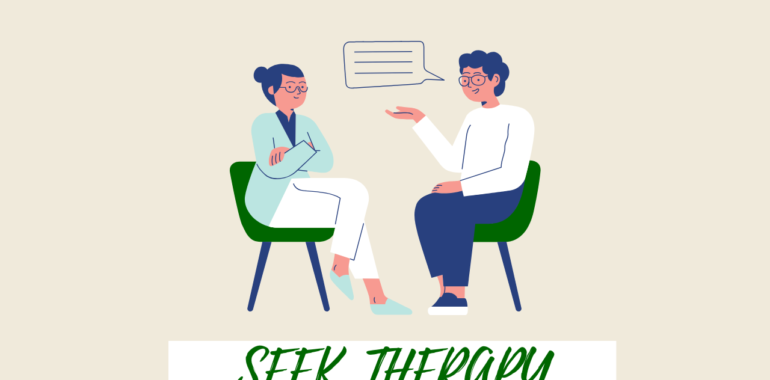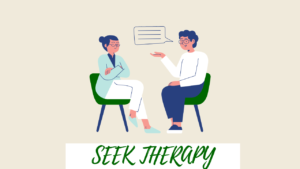Seeking Therapy: A Path to Mental Wellbeing in the Fashion Industry
Fashion is often seen as a glamorous world filled with beauty, creativity, and success. From dazzling runway shows to iconic magazine covers, the fashion industry is a dream for many aspiring individuals. However, behind the glitz and glam, the reality of working in fashion can often be overwhelming. The pressure to stay relevant, the desire to meet high expectations, and the constant race for perfection can take a significant toll on one’s mental and emotional well-being.
In a world where appearances are everything, there is an increasing need to discuss the importance of seeking therapy, mental health awareness, and self-care within the fashion industry. In this article, we will explore why mental health should be prioritized in fashion, how seeking therapy can be a tool for personal growth and well-being, and why breaking the stigma around therapy is crucial for fostering a healthier industry.
Mental Health in Fashion: The Hidden Struggles
The fashion industry, like many other creative industries, is notorious for its fast-paced, highly competitive, and often volatile nature. Whether you’re a designer, model, stylist, photographer, or journalist, the pressure to constantly innovate, perform, and maintain a flawless image can be mentally and emotionally taxing.
The Pressure to Be Perfect
Fashion is built on the idea of perfection — perfect bodies, perfect designs, perfect photoshoots, and perfect campaigns. This drive for perfectionism can create immense pressure, particularly for those working on the front lines of fashion, such as models and influencers. The constant comparison to unattainable beauty standards and the need to maintain a curated, “perfect” online persona can take a toll on mental health.
The Impact of Social Media
With social media platforms such as Instagram, TikTok, and Twitter becoming essential tools for promoting fashion, professionals are not just working in a public eye but are constantly exposed to criticism, unrealistic beauty standards, and the pressure of social validation. Models and designers are often subject to public scrutiny and may find it difficult to separate their self-worth from the approval they receive online.
Social media has created a “highlight reel” culture, where only the best moments are shared, leaving little room for vulnerability or struggles. This can lead to feelings of isolation, self-doubt, and anxiety. The pressure to present an idealized version of life on social media is particularly difficult in an industry where public image is crucial.
Body Image Issues
Body image is one of the most prominent issues within the fashion industry, especially for models who face criticism or judgment based on their appearance. This often leads to self-esteem issues and eating disorders. A study published in The International Journal of Eating Disorders found that models experience a high level of body dissatisfaction due to the constant pressure to maintain a specific body type. With the rise of the “size zero” trend in fashion, many models have reported experiencing disordered eating habits in order to fit the narrow standards set by the industry.
Although the industry has made strides in recent years by becoming more inclusive of diverse body types and ethnicities, body image struggles remain a pervasive issue for many individuals working in fashion. These challenges highlight the need for better mental health support and therapy for those affected by these pressures.
Work-Life Balance Struggles
In an industry where long hours, tight deadlines, and constant travel are the norms, maintaining a healthy work-life balance can be incredibly challenging. Designers, models, and other fashion professionals are often expected to dedicate their lives to their careers, sacrificing personal time and relationships for the sake of their jobs. This relentless work schedule can lead to burnout, anxiety, and depression.
For fashion professionals who travel frequently for shows, photoshoots, or business meetings, being away from home and loved ones can contribute to feelings of loneliness and isolation. This constant cycle of work and travel can make it difficult for individuals to establish a sense of stability, which is crucial for maintaining mental well-being.
Breaking the Stigma: Why Therapy Matters
Despite the growing awareness around mental health, many individuals in the fashion industry continue to shy away from seeking therapy. The stigma surrounding therapy remains, particularly in an industry where outward appearances and maintaining a strong persona are prioritized. However, therapy can be an invaluable tool for mental health and personal growth, helping individuals navigate the challenges and stressors that come with working in fashion.
The Power of Therapy for Self-Discovery
Seeking therapy offers an opportunity for self-reflection and growth. Fashion professionals often face intense external pressure to succeed, and therapy provides a safe space where individuals can explore their feelings, fears, and aspirations without judgment. Through therapy, individuals can gain greater self-awareness and better understand the root causes of their stress, anxiety, or insecurities.
Therapy encourages self-compassion, helping individuals acknowledge and accept their flaws and vulnerabilities. In a world that often focuses on external success, therapy offers a refreshing space to focus on internal growth and mental well-being.
Managing Stress and Anxiety
The fast-paced nature of the fashion industry can easily lead to feelings of overwhelm, stress, and anxiety. Whether it’s preparing for a major runway show or dealing with the pressure of meeting deadlines, these stressors can take a significant toll on one’s mental health. Therapy provides individuals with coping strategies to manage these feelings in healthy ways.
Techniques such as cognitive-behavioral therapy (CBT), mindfulness, and relaxation exercises can help individuals navigate stressful situations more effectively. By learning to reframe negative thoughts and adopt healthier coping mechanisms, individuals can better handle the challenges of the fashion world.
Building Emotional Resilience
One of the greatest benefits of therapy is that it helps individuals build emotional resilience. In the fashion industry, rejection is a common experience — models are not booked for shows, designers face criticism, and campaigns may not go as planned. These setbacks can be difficult to navigate without the right emotional tools.
Therapy teaches individuals how to cope with failure and rejection in a healthy way, helping them bounce back stronger. Emotional resilience is essential in an industry where failure is often part of the journey, and therapy provides the tools to manage setbacks with grace and determination.
Improving Communication and Relationships
In the fashion industry, professionals often work in close-knit teams, whether on a photoshoot, at a fashion show, or in a design studio. Effective communication and collaboration are essential for success, but the high-pressure environment can sometimes lead to tension or conflict. Therapy can help individuals develop better communication skills, allowing them to express their needs and concerns in a constructive way.
Additionally, therapy can help individuals strengthen their personal relationships by providing them with tools to better understand their emotions, set healthy boundaries, and manage stress in their personal lives.
Therapy Options for Fashion Professionals
There are many different types of therapy available, and individuals in the fashion industry should explore the options that work best for their unique needs and lifestyles. Some common therapy options include:
1. Traditional Therapy (In-Person Counseling)
Traditional therapy involves meeting with a licensed therapist in person for one-on-one sessions. This type of therapy allows individuals to build a strong therapeutic relationship with their counselor, which can be particularly beneficial for those working through deep-seated emotional issues.
2. Online Therapy
For fashion professionals who are constantly on the go or have busy schedules, online therapy can be a convenient option. Online therapy allows individuals to access therapy sessions remotely via video calls, phone calls, or messaging, providing greater flexibility and convenience.
3. Group Therapy
Group therapy involves participating in therapy sessions with others who share similar experiences. For those in the fashion industry, group therapy can provide a sense of community and understanding, allowing individuals to connect with others facing similar challenges.
4. Art Therapy
Art therapy is particularly beneficial for individuals in creative fields like fashion. It involves using creative expression, such as painting, drawing, or fashion design, to explore emotions and work through psychological challenges. Art therapy can help individuals in fashion reconnect with their creative side and use their craft as a form of emotional release.
5. Mindfulness and Meditation
Mindfulness-based therapies, such as mindfulness meditation and yoga, can help individuals manage stress, anxiety, and depression. These practices teach individuals to live in the present moment and cultivate self-compassion, which can be especially helpful in an industry that values external achievement.
The Role of Fashion Brands in Supporting Mental Health
While seeking therapy is an individual choice, fashion brands can play an essential role in supporting mental health within the industry. By prioritizing the mental well-being of their employees and collaborators, brands can foster a more compassionate, supportive, and sustainable industry.
Fashion companies can provide mental health resources to their teams, including access to therapy, counseling services, and stress-management workshops. Additionally, brands can take steps to create a healthier work environment by promoting work-life balance, addressing body image issues, and fostering a culture of inclusivity and self-acceptance.
Conclusion: Prioritizing Mental Health in Fashion
The fashion industry is not just about what we wear, but how we feel in what we wear. It’s a reflection of our identity, our creativity, and our aspirations. But for those working behind the scenes, the pressure to succeed and conform to idealized standards can have a significant impact on mental health.
Seeking therapy is a crucial step toward maintaining mental well-being in an industry that often prioritizes appearance and success over emotional health. Therapy offers individuals a chance to understand their emotions, cope with stress, build resilience, and improve relationships. By breaking the stigma surrounding therapy and mental health, we can create a more supportive and inclusive fashion industry where individuals can thrive, not just professionally, but personally.
The future of fashion is not just about clothes — it’s about well-being, self-expression, and the freedom to be ourselves. The industry can only truly evolve when we prioritize the mental health of those who make it all possible. Seeking therapy is not a sign of weakness but an important tool for self-care, resilience, and growth in a challenging and ever-changing industry.


